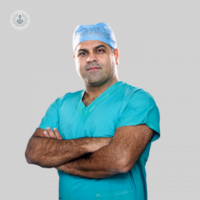When should I consider endoscopic sinus surgery?
Written in association with:Esteemed ENT specialist, Mr Karan Kapoor, is our latest accomplished medical expert to provide us with an informative article. Today, we find out what exactly endoscopic sinus surgery involves, and when and why patients would typically be recommended this operation.
What exactly does endoscopic sinus surgery entail?
It is an operation that takes place inside one’s nose to basically improve the ventilation. People undergo this operation as they seek a treatment option for nasal congestion, headaches, or things like polyps, which are blocking the nose and affecting the functioning of one’s nostrils.
It is important to recognise that endoscopic sinus surgery happens up your nose, and there will be no cuts made on the outside of the nose. We do this through the use of a special telescope and various other special small instruments which are all placed inside the nose.
When might this surgery be recommended to patients?
They are generally recommended it after we have tried medical treatment to try and reduce a patient’s symptoms as much as possible. It’s important to highlight here that sinus surgery doesn’t actually cure one’s symptoms, but it rather merely improves the overall ventilation of the nose, and allows medicine to better get onto the lining to effectively reduce symptoms.
When is it absolutely required?
It depends on the severity of the symptoms. If you can’t breathe through your nose, or if there is a growth in the nose that is blocking it, endoscopic sinus surgery can potentially be the ideal operation for you.
What are the main potential complications?
Roughly one in every 3,000 patients suffer damage to the wall between the nose and the eye socket. Also, about two in every 100 patients may suffer from a leak of fluid from the brain downwards. There is also a chance of a nosebleed, so we suggest that patients don’t drink too much hot tea or coffee not have hot showers for two days after an endoscopic sinus operation.
How effective is it?
Studies have shown that it can be up to 90 per cent effective when we consider the right patient. It is important to stress that one in eight patients might require a further operation within five years.
What is recovery time like, and what can patients expect after the surgery?
There are no cuts on the outside. However, you will feel quite tired and will notice internal bruising. Most patients can go back to work after 10 to 14 days following the operation, but it is very important that patients avoid flying immediately after, as the risk of a nosebleed is quite high on a plane after this operation.
Patients may require sinus rinses to try to wash the nose out and help improve the healing process. It is normal to experience pink mucus discharge for a couple of weeks after.
Mr Karan Kapoor can certainly be the right surgeon for you if you are considering undergoing endoscopic sinus surgery in the near future. Visit his Top Doctors profile today to book a consultation with him.



